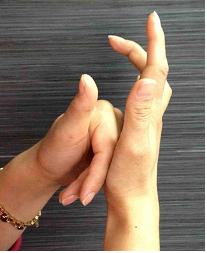Is Knuckle Cracking then
Reference:Castellanos J, Axelrod D. Effect of habitual knuckle cracking on hand function. Ann Rheum Dis. 1990 May;49(5):308-9.
Other than irritating the people around you, habitual knuckle cracking may not be so harmless after all. This study looked at 300 adults and of them 25% were habitual knuckle crackers.
Once again this study showed no correlation between cracking and hand OA. However the habitual knuckle crackers were more likely to:
- have swelling of the hands
- have lower grip strength
- smoke
- drink alcohol
- have a nail biting habitWhat does all that mean? I really don’t know. Although there was an association, we cannot possibly say that habitual knuckle cracking causes nail biting, smoking and alcoholism!
Be honest with your patients and tell them, studies show that habitual knuckle cracking does not seem to cause arthritis but it may weaken your grip strength. That thought may motivate them to stop or at least reduce their annoying bad habit.
Personal Comment: The truth is cracking joints can be very addictive! That is why it’s so difficult for some to simply stop their knuckle cracking habit. The same way it’s difficult for some to stop going for regular spinal manipulations. We all have patients who admit to “needing” their neck or back “cracked” regularly even though the relief is at best temporary!
This addiction to manipulation can start from a young age, promotes passive coping skills, which is a risk factor for chronic pain. Being “cracked” regularly may not be so harmless after all!
Posted on: March 23, 2013Categories: Wrist & Hand , Relevant Physical Therapy Articles


